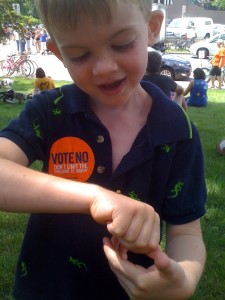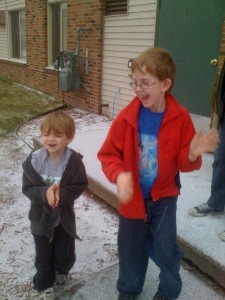 Curriculum & Instruction
Curriculum & Instruction  2 Comments
2 Comments Defiance and Expectations
This post is going to be fast and messy, but it’s been a big week, and I feel like I need to get this out there for the people in my life who get news from this blog or care about the topic at hand.
The school year started for the boys on September 4, and it’s been a rocky start. Connor, our 10-year-old, liked his teacher, and was overjoyed to be back with his friends, but every day it’s been excruciatingly difficult to get him out the door, and now Griffin is putting up the same fight because he’s taking the cue from his brother that School Is To Be Avoided.
Connor’s still fenced in by extreme anxiety when it comes to math (despite his extraordinary abilities in the subject–at least in my case, the anxiety came from not being able to do it). We’ve established psychiatric care and a great therapist, but he hasn’t got into the real swing of things with them yet, with regular appointments and close monitoring. And while the partial hospitalization program in which he participated last spring has removed the immediate threat of suicide, he’s still emotionally volatile, though to a less extreme degree and in fewer instances than he was before we found a combination of medications that work well for him.
Through all this, we’ve always been able to answer quickly and honestly that Connor is not a danger to anyone but himself, except in the instance that a concerned adult might try to put him/herself in his way when he’s in full, physical meltdown mode. This week, that changed. For reasons we still don’t fully understand, he attacked one of his good friends in class, at the end of a short, incredibly fast series of misunderstandings, misinterpretations, frustrations, and other perfect-storm-like colliding factors. He put her in a chokehold, refused to let go, then flung her down to the floor, and bolted from the room.
He was immediately swamped with remorse, and he doesn’t fully remember the instance, a good indication that his emotions had completely derailed any kind of reason (from a previous post, the elephant was in full charge, and probably lost the rider entirely for a time). And as parents, the news that your child hurt and frightened another child is so close to the horror and anger and grief of your child being the object of such an incident. We all took word of his 3-day suspension without a word of protest.
But the school social worker indicated quite plainly that, while Connor has a safety plan in place to prevent meltdowns or self-harm, he had crossed beyond what they can reasonably be expected to accommodate. She told us that she could schedule a tour of the dedicated special education school in the district for later this week. We acquiesced, but I found myself immediately digging mental trenches for a long, difficult fight.
I had very clear expectations of what a move to this school would mean for my son. I expected the crowded, chaotic special ed classrooms I’ve seen in the schools I’ve attended and worked for. I expected lots of much more severely disabled or troubled kids, grouped together by age rather than ability level, each working with a teacher on everything from just holding a pencil to lessons well below their age level in difficulty. I expected to smell urine, to hear screams and overloud sounds. I expected to find a place that would be safety first, education a distant second, and the potential to crush my son’s soul. I expected to be told he would have to stay there for the rest of his education.
With thanks to the Saint Paul Public Schools and all the universal forces that watch over us, what we saw today at the RiverEast School couldn’t have been more different than what I expected to see. They’ve just expanded into more space, and the hallway with the fifth- and sixth-grade classrooms is open and peaceful. The classrooms had only three to five students in them; the class maximum is eight. They were uncluttered, functional, low-stimulation spaces, but brightly lit and well-equipped. Each room has a teacher, a paraprofessional, and a mental health specialist in them at all times. The kids were attentive to the lesson being taught at the front of the room, and nobody was telling them to stop moving in their own idiosyncratic rhythms of calming and self-stimulation.
I asked how they handled meds and meltdowns, and was satisfied with the answers. I asked if they offered gifted services. The program coordinator said no, but went on to explain that if Connor showed himself to be capable of working on sixth-grade math, they’d just move him up to the sixth-grade classroom for that subject, an accommodation that his regular school has never offered. She informed us that they use the same curricula as the rest of the district, which means that as they help him learn to work through his fears and anxieties about math, they’ll be helping him use the same curriculum his peers are using back at his regular school, so the transition back would be minimally disruptive. The reading curriculum is already determined by skill level, so he can work as far ahead as he is able.
Additionally, group and recreational therapy are a part of the everyday schedule, and their curriculum is responsive to the needs of the kids, so if there’s a particular issue that keeps coming up, they can spend some time working on that specific skill or emotion. And finally, the goal is to mainstream the kids back to their regular school as quickly as possible after reaching a stable, healthy, consistent level of self-management. This isn’t a warehouse for defective kids.
So we’re going to go along with this. I’m still feeling enormous guilt for not just taking on the task of homeschooling or any of the other, more parent-centered options. Heavens know I’m equipped to teach him, but our financial needs just don’t allow, and neither, frankly, do my own mental health needs. But of all the possible solutions to Connor’s emotional, intellectual, and physical needs, this one surprised me by being a real, humane, supportive option.
This isn’t the end of this story, by a long shot, but that’s where we are right now. Parents are never sure they’re doing the right thing by their kid; with special needs kids, that’s doubly so. But we can’t just stand still and wait for things to get better. We have to keep moving, and for now, this is the best direction we can find.
 1)
1)  2)
2) 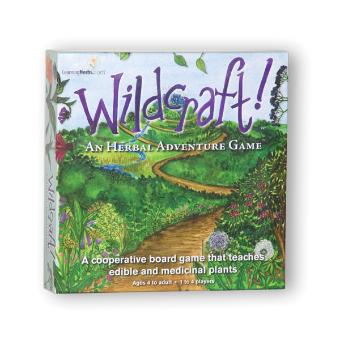 3)
3) 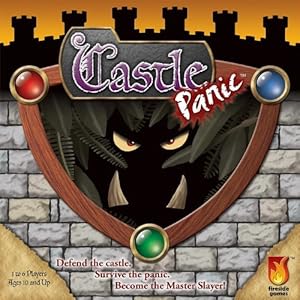 4)
4)  5)
5) 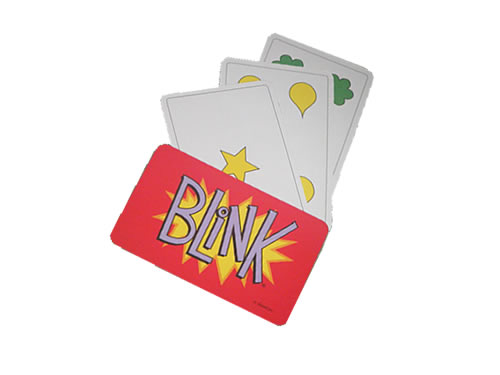 6)
6)  7)
7) 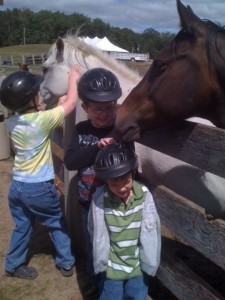


 Haidt also shares the results of his research into the moral foundations on which the edifices of conservative and liberal thought are built, and his conclusion is that part of the success of the modern conservative movement is based on the fact that conservative ideology appeals to a broader array of moral options than liberalism does. Since liberals often think of conservatives as “narrow-minded,” this sounds counter-intuitive, but really, it’s not. Liberals, Haidt demonstrates, derive their moral judgments almost entirely from whether something cares for or harms other beings, or whether it seems equalizing or discriminatory. Conservatives, on the other hand, respond less strongly to equality and care/harm, but additionally respond to messages of proportionality (more/less work=more/less reward), loyalty (to kin and other identity groups), sanctity (upholding standards of purity or pollution), and authority (respect for institutions), while many liberals actually perceive a threat from high degrees of those sources of morality. I think he’s really on to something, and I agree with what I heard Howard Dean talk about in a speech at Penn State, all the way back in 2004–that progressives won’t be able to accomplish their goals until they learn to articulate the morality of their position from all of these angles, and tap into the emotional heart of their message.
Haidt also shares the results of his research into the moral foundations on which the edifices of conservative and liberal thought are built, and his conclusion is that part of the success of the modern conservative movement is based on the fact that conservative ideology appeals to a broader array of moral options than liberalism does. Since liberals often think of conservatives as “narrow-minded,” this sounds counter-intuitive, but really, it’s not. Liberals, Haidt demonstrates, derive their moral judgments almost entirely from whether something cares for or harms other beings, or whether it seems equalizing or discriminatory. Conservatives, on the other hand, respond less strongly to equality and care/harm, but additionally respond to messages of proportionality (more/less work=more/less reward), loyalty (to kin and other identity groups), sanctity (upholding standards of purity or pollution), and authority (respect for institutions), while many liberals actually perceive a threat from high degrees of those sources of morality. I think he’s really on to something, and I agree with what I heard Howard Dean talk about in a speech at Penn State, all the way back in 2004–that progressives won’t be able to accomplish their goals until they learn to articulate the morality of their position from all of these angles, and tap into the emotional heart of their message.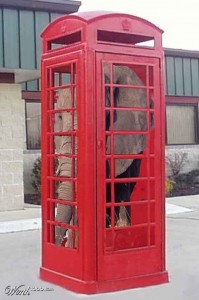
 And, sure enough, when we went out to pick
And, sure enough, when we went out to pick  I took the boys to the
I took the boys to the 